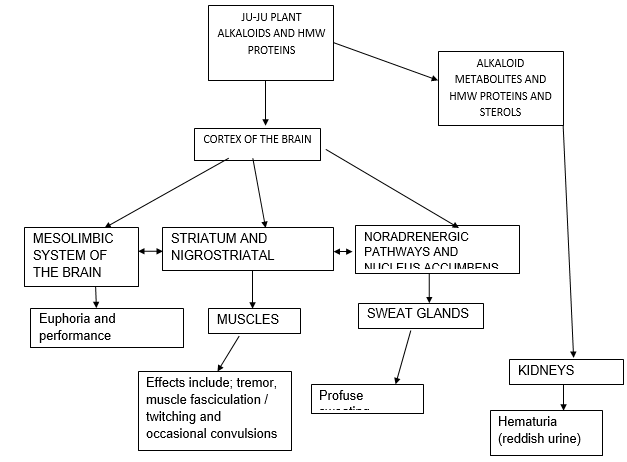Introduction
The substances responsible for the toxic effect of plants arise through different biogenic pathways, and are mostly so-called secondary metabolites, whose formulation and accumulation so clearly distinguish plant metabolism from that of the animal organism. Many plant chemicals are highly active substances and, since ancient times they have served the purpose of treatment, murder and suicide (Cordell, Helmuth, Manske, & Holmes, 1998). The occurrence of other pharmacologically less active substances makes a plant material toxic either because they are present in high concentrations or because they accumulate after chronic use.
Mechanisms of Intoxication Syndrome
The effects of the Ju-Ju plant described are psychedelic and amphetamine-like effects. The syndrome that develops in the people who use the plant are due to dopaminergic, serotoninergic and noradrenergic effects of the plant or its metabolites on the mesocortical and limbic pathways. The alkaloids in the plant increase the concentration of dopamine in the synaptic cleft, thereby increasing its effects on the post-synaptic neuron (Goodman, Gilman, Brunton, Lazo, & Parker, 2006). The effects of dopamine, in nigrostriatal dopaminergic pathways of the striatum and substansia nigra include altering motor activity by influencing the extrapyramidal pathways (Boyd, 2008). This explains motor effects seen in the rituals such as tremors, occasional convulsions and muscle fasciculations.
Since these dancers presumably take the leaves of the Ju-Ju plant for performance enhancement, the alkaloids have euphoric effects which are mediated by the reward circuit of the brain. This involves connections between the cortex and the mesolimbic cortex, which are serotoninergic pathways (Hyson & Johnson, 1999). Serotonin in the central nervous system is known to mediate euphoria and explains the reward effects that come with drug abuse.
Dopamine is a precursor of noradrenaline and adrenaline, which, acting centrally, mediate effects such as profuse sweating and flushing, seen in these people who chew the leaves of Ju-Ju.
The alkaloids undergo hepatic metabolism, to produce metabolites that may cause damage to the renal glomerular barrier during ultra-filtration, presenting with reddish urine (Cordell, Helmuth, Manske, & Holmes, 1998). The metabolites may also cause reddish discoloration of urine.
High molecular weight proteins found in the plant may be metabolized into plant sterols, and cause hormonal imbalance in the adrenal steroid synthesizing system, leading to sloughing-off of mucous membranes of the urogenital system in a similar manner to what happens during menstruation (Hyson & Johnson, 1999).
Diagram of the fate of the ju-ju components and pathways of the observed intoxication syndrome.
Key: The arrows points the direction the effect or response takes to realize the signs observed.

List of References
Boyd, M. A. 2008. Psychiatric nursing: Contemporary practice. Philadelphia: Lippincott Williams and Wilkins.
Cordell, G. A., Helmuth, R., Manske, F., & Holmes, H. L. 1998. The Alkaloids: Chemistry and Physiology. San Diego: Academic Press Ltd.
Goodman, L. S., Gilman, A., Brunton, L. L., Lazo, J. S., & Parker, K. L. 2006. Goodman and Gilman’s: The pharmacological basis of therapeutics. New York: McGraw-Hill Ltd.
Hyson, R. L., & Johnson, F. 1999. The biology of early influences. New York: Kluwer Academic Plenum Publishers.